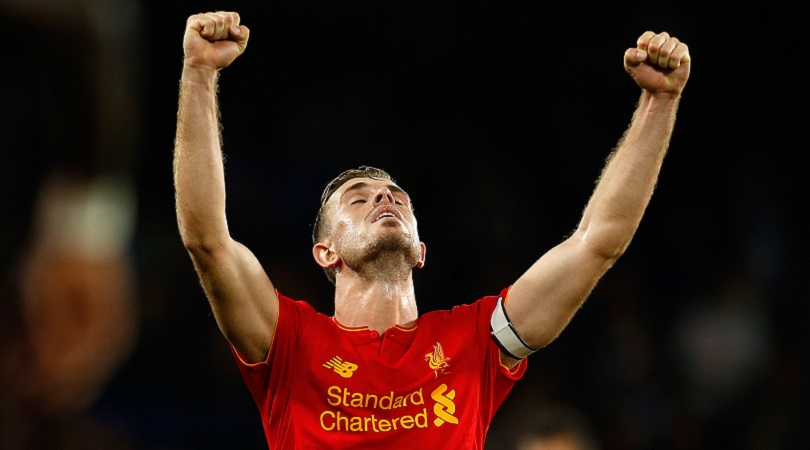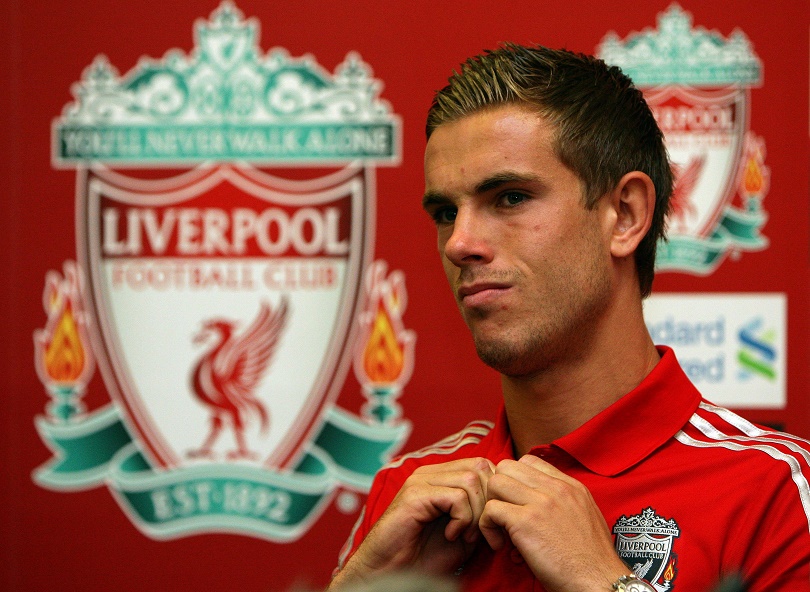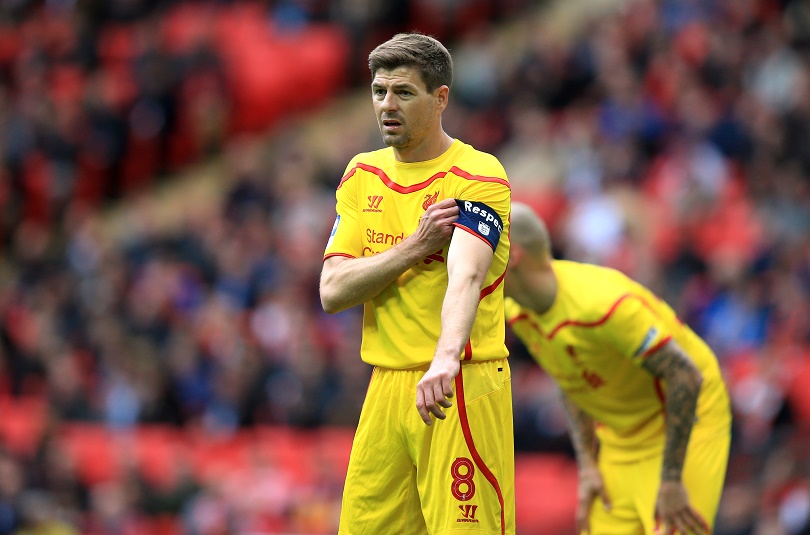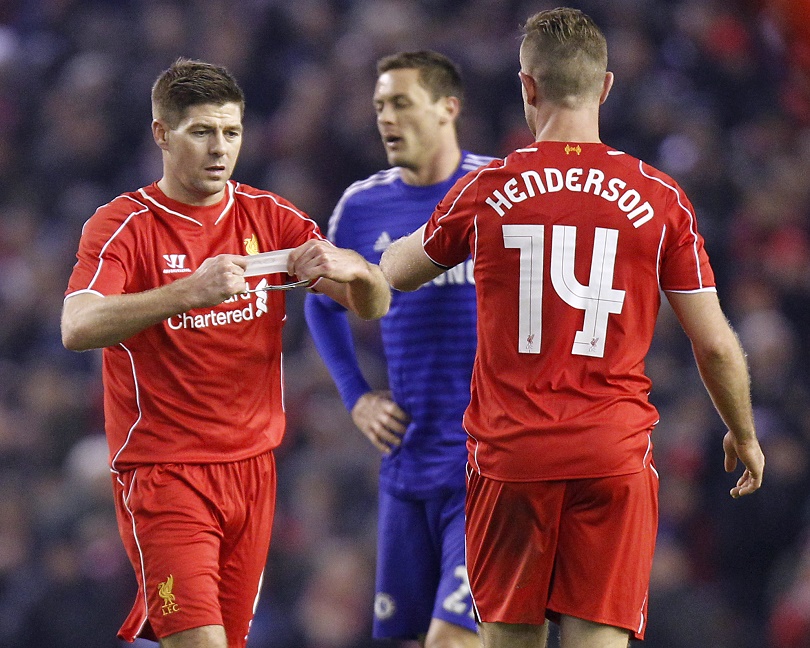How Jordan Henderson shrugged off Stevie G's ghost to become his own man at Liverpool
After the Reds midfielder was handed the England armband this week, Seb Stafford-Bloor explains how he's quietly developed into a natural skipper

Damien Comolli's been in the news. Talking in defence of his spell at Liverpool, the club's former director of football strategy has claimed that the high-price purchase of Jordan Henderson was the primary reason for his 2012 dismissal.
“The day I got sacked they told me I had made a big mistake on Jordan and he was a waste of money. Everybody is entitled to their own opinion, but I think we paid the right price.”
It wasn't a coincidence that Comolli chose to share that information on the day that Henderson was announced as Wayne Rooney's interim successor as England captain, nor was it a surprise that he omitted his part in the transfers of Stewart Downing, Andy Carroll and Charlie Adam. But he has a point: after a difficult start, Henderson has proven to be a success at Anfield.

Ambitious succession
The club is, through its history, significance and direct association with a lingering local tragedy, woven into the city's fabric. Gerrard, as a childhood fan and the cousin of a Hillsborough victim, was a natural icon
Comolli would also claim that he'd always envisaged the midfielder as the natural heir to Steven Gerrard's captaincy. That may or may not be true, but even with the benefit of hindsight it still seems rather fanciful. Henderson may share certain personality traits with Gerrard and those may well have been apparent from an early age, but he arrived on Merseyside as a bundle of unrefined attributes. Though his chance-creation statistics were apparently impressive, there was no indication of the type of player he would become and even fewer hints of any distinctive leadership characteristics.
We're often accused in this country of over-emphasising the role of a captain. Whenever this topic arises, either in relation to a prominent club side or to the national team, we're helpfully reminded that it's largely a ceremonial role in different parts of the world. True as that may be, it doesn't invalidate the relationships which do still exist between some British communities and their football teams – and, by implication, the captains of those sides.

The travel writer Bill Bryson once clumsily referred to the city of Liverpool's attachment to its football team as a "pathetic reliance". A gross misstep for a variety of reasons, it ignored the area's social and economic history and failed to identify it as a place where, more than most, the traditional surrounding communities have remained intact.
Get FourFourTwo Newsletter
The best features, fun and footballing quizzes, straight to your inbox every week.
The club is, through its history, significance and direct association with a lingering local tragedy, woven into the city's fabric. Steven Gerrard, as a childhood fan and the cousin of a Hillsborough victim, was a natural icon. Replacing him both as a player and a symbol was among British football's most unenviable tasks – especially so for Henderson, a relatively inferior player born in Sunderland and in possession of few similar traits. For Comolli to have seen him as an obvious successor is bizarre.
Learning curve
There have been times when his style of captaincy has seemed too fluid and it's often appeared as if, rather than defining his own brand of leadership, he's simply tried to do his best Steven Gerrard impression instead
The Gerrard era created certain expectations of a Liverpool captain: beyond his organic relationship with the crowd, he was a superb player who specialised in game-winning dynamics. In essence, he was an idealised portrait of a leader who was more force of nature than simple footballer.
By contrast, Henderson has always been a connecting piece at Anfield. At his lowest Liverpool point, a time when he was almost loaned to Fulham, he salvaged his career by successfully adapting to his side's existing strengths. Whereas Gerrard was a natural talisman who played with wonderful impulse, Henderson is more an example of someone who has thrived by accepting his limitations, prioritising his strengths and following coaching instruction.
The size of his task has been understated and, evidently, it's one he has laboured against for most of the past 18 months. There have been times when his style of captaincy has seemed too fluid and it's often appeared as if, rather than defining his own brand of leadership, he's simply tried to do his best Gerrard impression instead.
It was damaging and, while Liverpool were afflicted by a range of issues during the Brendan Rodgers/Jurgen Klopp changeover, Henderson's patchy form was a core ailment. The burden of the captaincy appeared to disrupt his equilibrium and tempt him towards a role for which he wasn't equipped. Whether real or imagined, there seemed a natural hesitation to his play and an awkward deference to "what Steven would have done" in certain situations. He would have taken that shot. He would have tried a raking pass. He would have snapped into that tackle; for all intents and purposes, Henderson appeared to be fighting battles with his inner monologue.

Growing in
Characterised most vividly by his standout performance against Chelsea at Stamford Bridge, he seems content to be his team's solid centre
It's to Henderson's great credit, then, that he seems to have overcome those difficulties. Liverpool's form has been good without being spectacular this season, replicating Henderson's own peaks and troughs, but it's already offered glimpses of the type of captain he intends to be – and, more importantly, suggested that he's comfortable with his own interpretation of the role.
Characterised most vividly by his standout performance against Chelsea at Stamford Bridge, he seems content to be his team's solid centre. To much mirth, Brendan Rodgers once described him as the club's "moral compass" but, though dismissed as a Brendanism at the time, that's become an accurate way of describing him.
Henderson scores against Chelsea
Henderson may have scored a wonderful goal in that game, but he also had a deeply felt impact on its general shape and the reliability of his distribution enabled Liverpool to control the match in their opponent's half. That night, there were more dynamic performances and many other reasons why Chelsea were beaten, but he was the lock on the door; his movement of the ball kept Antonio Conte's side off balance, and his retrieval of it also prevented them from gaining any traction in the Liverpool half.
And this is who he is now and who, ultimately, he has accepted that it's OK to be. Henderson is seemingly content to be the rhythm section in the band. If Gerrard was all loud trumpets and saxophones, he is the steady bass guitar. As a nation, we probably do overstate the role of a captain and are a little too enthralled by its anachronistic values. In some cities, though, that armband is heavier than in others. Liverpool is one of those places and Jordan Henderson is only just adjusting to that weight.
Seb Stafford-Bloor is a football writer at Tifo Football and member of the Football Writers' Association. He was formerly a regularly columnist for the FourFourTwo website, covering all aspects of the game, including tactical analysis, reaction pieces, longer-term trends and critiquing the increasingly shady business of football's financial side and authorities' decision-making.

